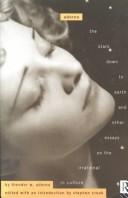176 pages
Langue : English
Publié 9 août 1994 par Routledge.

176 pages
Langue : English
Publié 9 août 1994 par Routledge.
Theodor Adorno was one of the giants of twentieth-century thought. This volume collects his key articles on the irrational in mass culture. Although he wrote them half a century ago Adorno's ideas are relevant to the understanding of phenomena as apparently diverse as: astrology and "New Age" cults the power of neo-fascist propaganda and the re-emergence of anti-Semitism* the psychological basis of popular culture.His superb essay, The Stars Down To Earth is an innovative and startling analysis of the astrology column in a Los Angeles newspaper. Adorno argues that the column promotes fascist dependency and social conformism in much the same way as fascist propaganda. He maintains that the same principles operate in the mainstream products of the `culture industry'. The three shorter papers illuminate different aspects of Adorno's argument: the relation of occultism to orthodox modern thought, the pervasiveness of anti-Semitism, and the 'psycho-technic' rhetoric of fascist propaganda. The …
Theodor Adorno was one of the giants of twentieth-century thought. This volume collects his key articles on the irrational in mass culture. Although he wrote them half a century ago Adorno's ideas are relevant to the understanding of phenomena as apparently diverse as: astrology and "New Age" cults the power of neo-fascist propaganda and the re-emergence of anti-Semitism* the psychological basis of popular culture.His superb essay, The Stars Down To Earth is an innovative and startling analysis of the astrology column in a Los Angeles newspaper. Adorno argues that the column promotes fascist dependency and social conformism in much the same way as fascist propaganda. He maintains that the same principles operate in the mainstream products of the `culture industry'. The three shorter papers illuminate different aspects of Adorno's argument: the relation of occultism to orthodox modern thought, the pervasiveness of anti-Semitism, and the 'psycho-technic' rhetoric of fascist propaganda. The collection shows Adorno at his brilliant and maddening best. Stephen Crook's introduction critically reviews Adorno's argument and offers an assessment of its contemporary relevance.